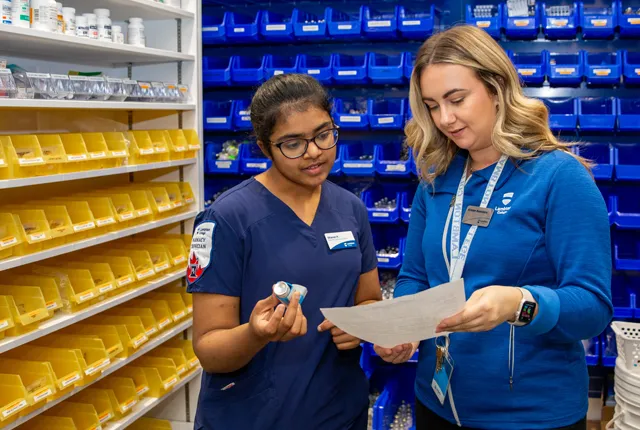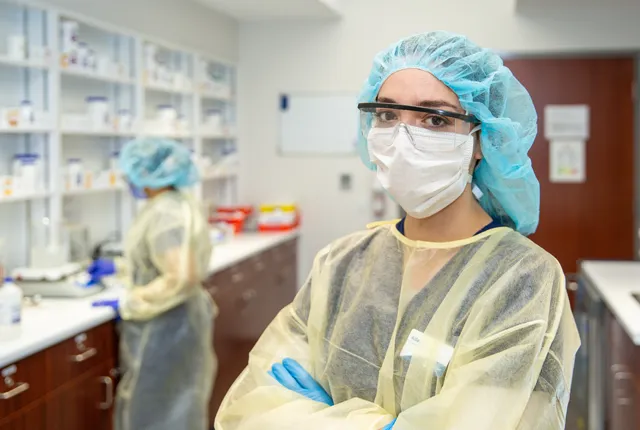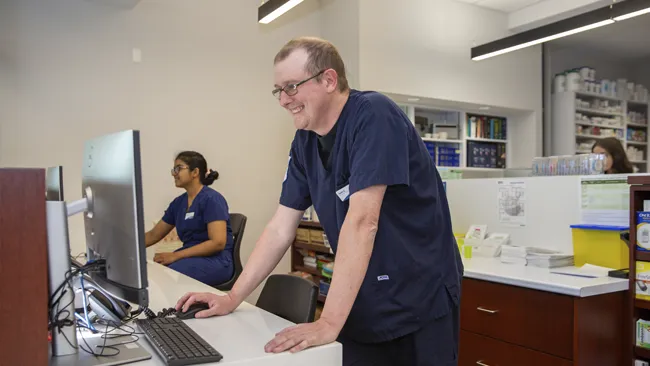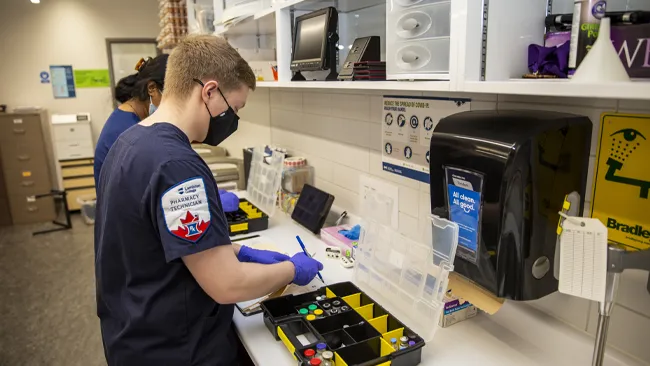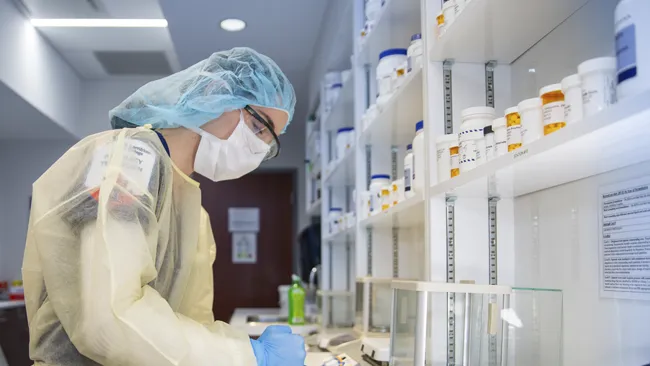
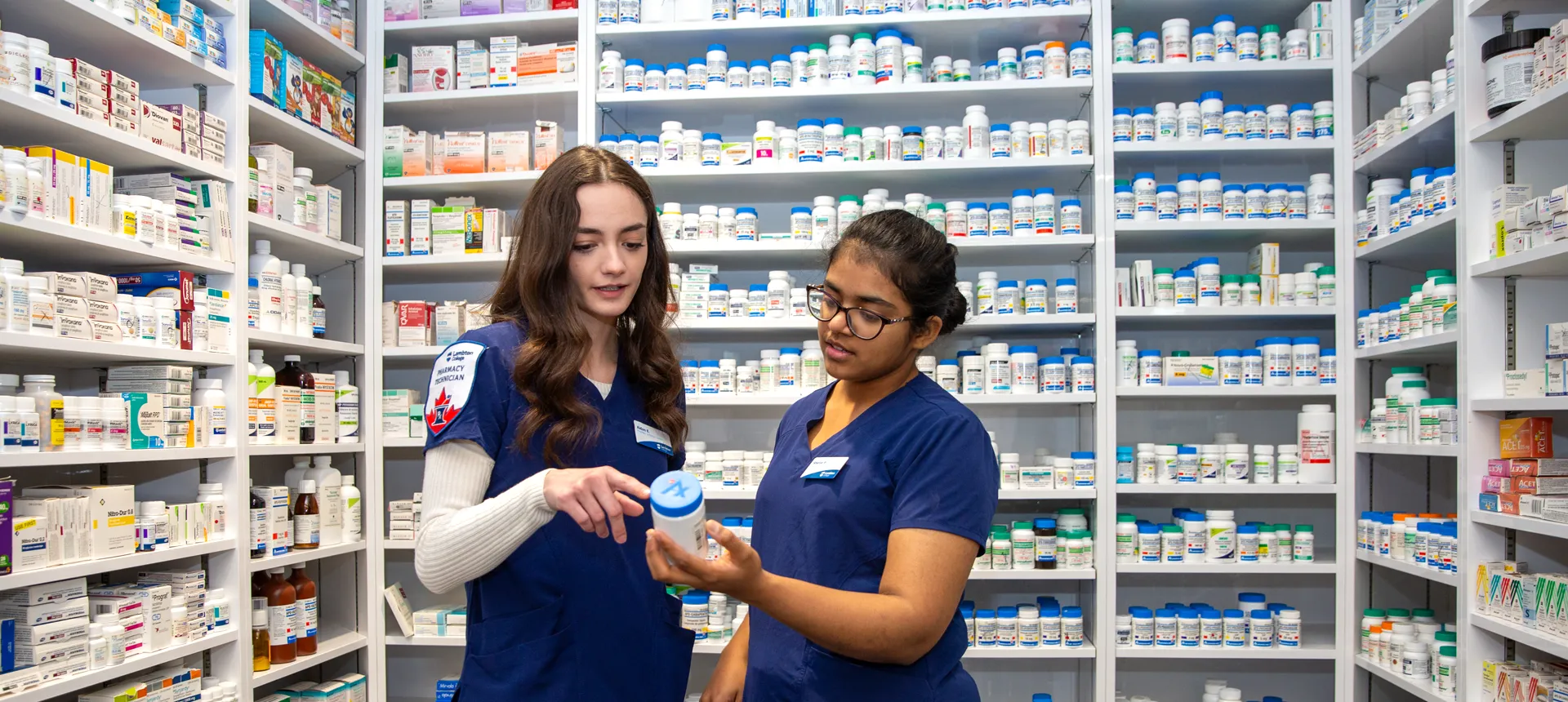
Pharmacy Technician
Overview
Prepare for a dynamic career in healthcare with Lambton College’s accredited Pharmacy Technician program. Gain hands-on training in advanced labs, learn industry-relevant skills, and graduate ready to excel in community and hospital pharmacy settings.
Lambton College students experience learning that is innovative, engaging, and simulates real pharmacy practice. Pharmacy Technicians are in high demand, not only in Ontario but throughout Canada. Our students are trained in our state-of-the-art NOVA Chemicals Health & Research Centre which features three pharmacy labs - compounding, hospital and community.
Blended learning is highlighted in our program and allows our students increased flexibility in their schedules. Faculty support diverse learning needs in our program by utilizing engaging lessons that include full simulations, role playing activities, and guest speakers.
Under the supervision of a pharmacist or pharmacy technician licensed in Ontario, students will complete two unpaid field placements after the completion of all core courses: one in a community pharmacy and one in a hospital pharmacy setting. These experiential learning placements take place immediately after the completion of Term 4. Travel and additional costs are required.
Upon graduation students are eligible to write both national and provincial licensing exams.
The Pharmacy Technician Program of Lambton College has been awarded the status of Accreditation by the Canadian Council for Accreditation of Pharmacy Programs from January 2022 to June 2028.
Our Program Commitment
Admission Requirements
O.S.S.D. or equivalent with a minimum grade of 60% in the following:
- Grade 12 English C or U
- Grade 12 Math C or U
- Grade 11 or 12 Biology C or U
- Grade 11 or 12 Chemistry C or U
Academic admission requirements can be obtained through Academic Upgrading and the Pre-Health Sciences Pathway to Certificates & Diplomas (PHSP) program at Lambton College. All course requirements must be completed no later than the first day of classes of term one.
Admission into a CCAPP-accredited Pharmacy Technician program is limited to candidates who provide documentation of one of the following as evidence of language proficiency:
- Language proficiency test results that meet the National Association of Pharmacy Regulatory Authorities (NAPRA) Language Proficiency Requirements for Licensure as a Pharmacy Technician in Canada; or
- Graduation from a high school in Canada with four consecutive, first language English or French courses/credits; or
- Graduation from a College d'enseignement general et professionnel (CEGEP) in Quebec with four consecutive first language Engligh or French courses/credits; or
- An undergraduate degree from a university in Canada, whose instruction was provided in English or French.
This program has fluency proficiency requirements for students whose first language is not English or French.
Hear about the unique aspects of our program
Hear about the spaces where our students study and how they put their skills to practice in the real-world.
Costs
- Year 1 $4,256.72
- Year 2 $4,238.97
Please Note: These fees apply to the 2025-2026 academic year and are subject to change. Fees do not include books (unless specifically noted), supplies or living costs.
Additional Fees
-
Passport to Placement$40.00
-
Mask Fit Testing$45.00
-
Uniform & Related Supplies$100.00
-
Name Tag$15.00
-
Capstone Experience (PHR-4022)$600.00
-
Lab Kit Fees$425.00
Scholarships Available
There are 9 scholarships available for this program, with a total value of $2,000!
Technology Requirements
In order to keep pace with the requirements of each and every course in your program, Lambton College requires that each student have access to a laptop while studying at our college.
Pharmacy Labs
Courses
Critical Thinking and Writing
This writing course challenges students to explore diverse opinions and articulate their own perspectives clearly and persuasively. Through critical reading, students will develop skills in synthesis, analysis, comparison, and response, striving for clarity and diplomatic expression of their opinions based on factual evidence. Students will practice various rhetorical strategies of persuasion and hone their writing to ensure precision and accuracy in their messages. This course lays the foundation for a subsequent research-writing course, equipping students with essential skills for academic success.
Interprofessional Perspectives
As a new student to a health care profession this course introduces you to the workings of interprofessional teams. It allows learners to gain knowledge with and from students of various programs about several different health care professions. Concepts of teamwork, conflict resolution, the health care system and ethics will be presented through a unique interprofessional delivery model.
Pharmacy Fundamentals and Legislature
This course provides students with an in-depth understanding of pharmacy legislation and its impact on healthcare practices in Canada. Students will explore the historical development of pharmacy and its role within the healthcare team. Current issues in pharmacy, including pharmaceutical care, drug-related problems, and medication management, will be discussed. Students will learn about the authority of the Ontario College of Pharmacists and the regulations governing the practice of pharmacists and pharmacy technicians. The course will also cover the role of various healthcare professionals, regulatory bodies, and professional associations in meeting patient healthcare needs. Ethical and professional principles, as well as patient safety and medication error prevention, will be examined. Students will explore relevant documents, including federal and provincial legislation, policies, by-laws, and standards related to pharmacy practice. The course will delve into specific acts and regulations, such as the Controlled Drugs and Substances Act, the Food and Drugs Act, and the Personal Information Protection Electronic Documents Act, among others. Additionally, students will gain knowledge about the Canada Health Act, the Non-Insured Health Benefits for First Nations and Inuit, and the Ontario Drug Benefit Program. Effective communication skills, patient rights, and privacy and confidentiality in pharmacy practice will also be discussed.
Applied Pharmaceutical Calculations I
This course introduces the Pharmacy Technician students to pharmaceutical calculations. Students will review basic mathematics including fractions, ratios, decimals, percents, proportions and imperial, metric and apothecary measurement. The basic mathematic principles will then be applied to solve pharmacy-related problems/calculations. The course emphasizes the importance of performing precise calculations when dealing with medications.
Retail Dispensing Theory and Lab
This course introduces the student to the written prescription, Latin abbreviations, dosage forms, and the information on a prescription required by law. Generic and brand name recognition is stressed for the top prescribed medications. Students are required to perform various pharmacy computer tasks using community pharmacy software programs. This course introduces students to the roles and responsibilities of the pharmacy technician, pharmacy assistant and pharmacist in various community pharmacy practice settings.
Anatomy and Physiology
This course is designed to provide pertinent information about the human body and how it functions. The study is concentrated on medical terminology, cells, tissues, organs, and systems and how the systems work together for human survival.
General Education Elective
Communications for Health
This course, designed for students in the health field, further develops students' communication proficiency. Students create workplace documents and research reports and share their findings through oral presentations. Advocacy and peer education will drive the research and documentation process. Current health issues and research will serve as the impetus for creation of informed research reports and presentations.
Retail Dispensing Lab and Inventory Practices
This course extends the skills from Retail Dispensing Lab I, focusing on efficiency in selecting and processing prescriptions, managing drug interchangeability and interactions, and handling third-party plans. Students will dive into meds checks, influenza and COVID vaccinations, Exceptional Access Program, and the Patch 4 Patch program. Students will learn about specific treatments such as Butrans, Methadone, and Suboxone with a focus on the role of the pharmacy technician in dispensing these medications. The course also covers drug destruction protocols and introduces students to medical devices. The curriculum incorporates team dispensing, multi-tasking, and customer service strategies, using case studies with various healthcare scenarios. Additionally, students will delve into the theory and practical applications of inventory management, covering purchasing, receiving, storage, stock rotation, monitoring expiry dates, return policies, and associated paperwork. This prepares students for effective and efficient pharmacy operations.
Pharmacology I
This course provides a foundation in the study of pharmacology. It will familiarize the Pharmacy Technician student with the study of prescription medications. Students will learn therapeutic and pharmacological classifications of drugs. The student will be introduced to the basic action on the body of a variety of drug classifications, new drugs for the health care market and drug usage.
Non-Prescription and Home Health Products
This course provides a deep dive into non-prescription and home health products. Students will learn regulations regarding non-prescription medications and health products. The course explores various health conditions and corresponding non-prescription treatments, including their mechanisms, adverse effects, and interactions. Key topics include nutritional and herbal products, homeopathic medicines, over-the-counter contraception, and smoking cessation aids. Practical knowledge extends to products for infant care, incontinence, and ostomy care. The course also features hands-on demonstrations of health and medical devices, including inhalers and point-of-care monitoring devices. Students will explore their roles in promoting health-enhancing behaviors like smoking cessation, understand the use of compliance aids, and learn about specialized devices in the pharmacy field.
Pharmacy Compounding Theory and Lab
In this comprehensive course, students will delve into Pharmacy Compounding, engaging with both theory and practical lab components. A significant emphasis will be placed on the NAPRA Model Standards for Pharmacy Compounding of Non-Sterile Preparations and its accompanying Guidance Document. Students will understand the importance of these standards, their implications for non-sterile compounding, and the application of these standards in their practice. Through individual and group exercises, students will prepare common pharmaceutical compounded preparations. Preparation techniques, calculations, weights and measures will be thoroughly covered, underlining the need for an accurate and organized process to achieve a pharmaceutically elegant product. Students will learn how to complete a master formulation record, encompassing all necessary elements such as ingredients, quantities, procedures, equipment, and labeling requirements. The course will detail different levels of requirements for non-sterile compounds, including safety measures, precautions, and quality control methods associated with each level. The curriculum will familiarize students with legislation and the documentation procedures required for compounded products. Emphasis will be given to the importance of timely cleaning and maintenance of compounding equipment and the environment to ensure safety and efficacy in the compounding process.
Interpersonal Interaction in Pharmacy Practice
This course provides a comprehensive study of communication and interpersonal dynamics within the pharmacy profession. We aim to foster self-awareness and develop effective collaboration and conflict-resolution techniques for career success. The course emphasizes diversity, and teaching strategies to understand, respect, and accommodate differences. It addresses the concept of bias, offering methods for recognition and mitigation. Microaggressions, their impact, and strategies for their identification and response are thoroughly discussed. This course ultimately seeks to equip students with the necessary skills and cultural competence to serve diverse patient populations effectively and empathetically.
Applied Pharmaceutical Calculations II
In Applied Pharmaceutical Calculations II, the Pharmacy Technician students perform advanced pharmaceutical calculations when dealing with medications. This course prepares the students to do the necessary calculations used in pharmaceutical manufacturing of stock solutions, extemporaneous compounding and parenteral solutions, pediatric and chemotherapeutic admixtures.
Computer & Institutional Dispensing
This course provides an introduction to hospital pharmacy practice. Students will learn to accurately interpret Physicians' orders and patient records. This course covers key topics such as automatic stop orders, hospital formularies, and auto-substitutions, conducting quality assurance checks, maintaining crash carts, automated drug dispensing, and preparation of unit dose packaging. Simulations will occur throughout this course to reflect real-life practice settings, pharmacy teamwork, and interprofessional interactions.
Pharmacology II
Pharmacology II provides students with a thorough understanding of medications used in treating gastrointestinal disorders, respiratory disorders, men's and women's health issues, endocrine diseases, immunological system diseases, skin disorders, and oncology. The course will also cover the mechanisms of action for these medications and how to identify and address issues, such as drug allergies, adverse effects, and drug interactions. Additionally, students will learn to recognize warning labels and precautionary messages associated with specific medications.
Sterile Techniques Theory and Lab I
This course is an introduction to the Principles of Aseptic Technique as a combined theory and practical lab. The students will learn the basic skills required to safely prepare sterile preparations. Introducing various manipulations, incompatibilities, dosage calculations, and products. Observance to aseptic technique procedures and quality assurance controls will be emphasized through demonstration and practice.
Hospital Pharmacy Procedures
The student is introduced to the organization of hospitals, the functions and services of the hospital pharmacy, institutional communications, and operations systems that are a fundamental element of health care institutions in Ontario. Legislation that governs hospital pharmacy, the role of the hospital pharmacist, pharmacy technician, and other health care professionals will be discussed. The student will become familiar with hospital accreditation, policies and procedures, quality improvement programs, drug utilization reviews, and risk management procedures.
Professional Issues
This course introduces students to a number of ethical and professional issues in pharmacy practice. Students will discuss current issues and trends that influence the practice of pharmacists and pharmacy technicians, pharmacy organizations, and the pharmaceutical industry. Other topics include bioethics and ethics concerning health care, medication incident and adverse reaction reporting. This course challenges students to reflect on their own values and beliefs, and through discussion, to explore those held by others.
General Education Elective
Examination of Prescriptions
This course integrates knowledge and skills that were developed through previous course including applying national and provincial legislation, performing calculations, demonstrating best practices in product distribution, and utilizing pharmacy resources efficiently. Students will demonstrate optimization of patient health outcomes through safe and effective drug distribution systems. A focus will be placed on the accurate dispensing of medications within the Pharmacy Technician's scope of practice. The practice of technical checking will be perfected.
Institutional Dispensing II
This course introduces the students to nursing homes, retirement homes, developmental group homes, and children's group homes, with a focus on the role of the Pharmacy Technicians within these organizations. Students will be able to understand drug distribution practices from hospitals, community and various long-term care dispensing perspectives. Provincial formularies and government supply medication will be explored. Students will prepare medications in unit dose and multidose packaging systems utilizing the same technology as real-life practice settings. Zero tolerance for error will be emphasized during the independent double-check of packaged products.
Sterile Techiques Theory and Lab II
Sterile Technique Theory/Lab II builds upon the material that was taught in Sterile Technique Theory/Lab I. Students will learn advanced sterile techniques including how to prepare patient infusion pumps, patient-controlled analgesia, large volume parenterals, minibags, and total parenteral nutrition. Students learn quality assurance and health and safety protocols related to advanced sterile techniques. Both hazardous and non-hazardous preparations and protocols are taught in this course.
Journey to Practice
This course prepares the student to write the PEBC and OCP licensing exams. SPT and licensing requirements are highlighted to provide students with a smooth transition from college study to a licensed Pharmacy Technician in Ontario. Students will be introduced to pharmaceutical industry and the roles that a Registered Pharmacy Technician hold in various fields. Simulations will occur throughout this course to reflect real life practice settings and pharmacy team work. Application of knowledge from previous terms will be enhanced with development of soft skills that are required for successful practice after graduation. Students will demonstrate consolidation of knowledge gained throughout the Pharmacy Technician Program by completion of a comprehensive exam.
Community Field Placement
The Community Field Placement provides the student with the opportunity to apply and develop the practical skills that they have learned in the program. This placement experience is 200 hours completed over 5 weeks. The student will at all times work under the direct supervision of a Pharmacy Technician or Pharmacist licensed in Ontario. The focus will be placed on ensuring all of the NAPRA entry to practice competencies related to community practice are successfully demonstrated at the placement site.
Institutional Field Placement
The Institutional Field Placement provides the student with the opportunity to apply and develop practical skills that they have learned in the program. This placement experience is 160 hours completed over 4 weeks. The students will at all times work under the direct supervision of a Pharmacy Technician or Pharmacist licensed in Ontario. The focus will be placed on ensuring all of the NAPRA entry to practice competencies related to institutional practice are successfully demonstrated at the placement site.
General Education Elective
Contact
School of Fire Science, Health & Community Services
Program Information
After Graduation
Employment Opportunities
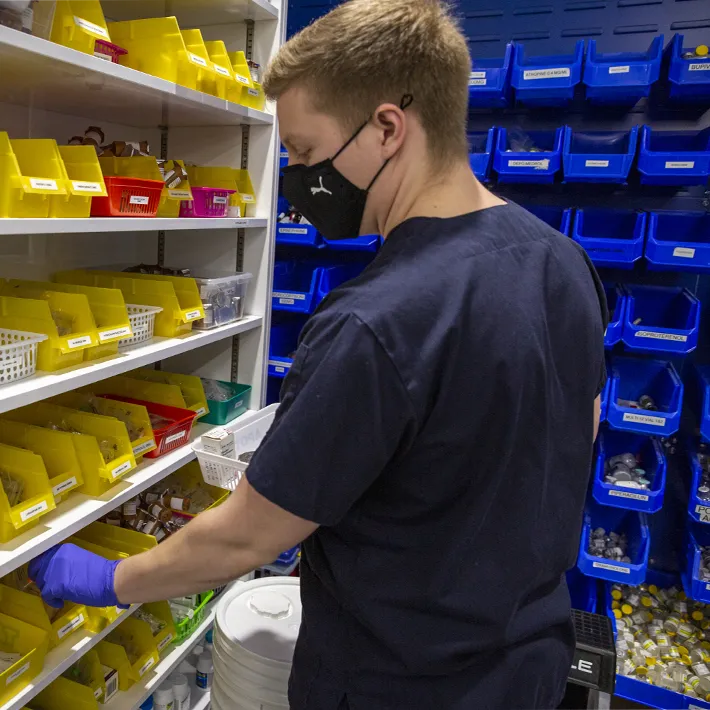
Pharmacy Technicians are in high demand and are able to work in many different settings including community pharmacies, hospital pharmacies, long term care pharmacies, insurance companies, government agencies, regulatory bodies and advocacy associations.
Accreditations & Certifications
Ontario College of Pharmacists
Graduates are eligible to proceed to the regulation process through the Ontario College of Pharmacists and the Pharmacy Examining Board of Canada.
Placement
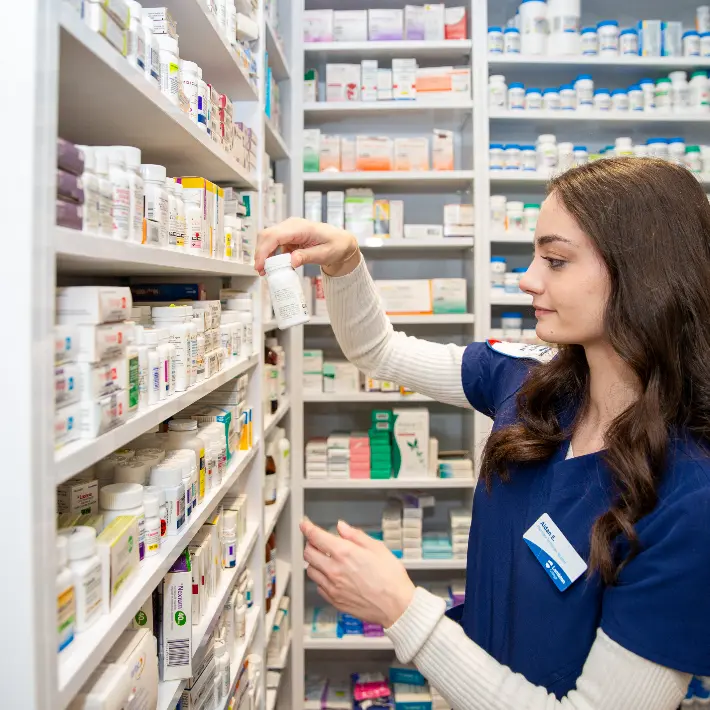
Vaccinations & Police Record Checks
Students considering this program should be aware that there are field placement requirements. All placements require students to have police record checks. Proof of immunizations is also required and must be cleared through Passport to Placement.
Once you’ve applied, you can log in to mylambton.ca and view the program-specific Field & Clinical Placement Requirements. If you need information about these requirements before applying, please contact placementinfo@lambtoncollege.ca.
Total unpaid placement hours
Hours completed in Community Pharmacies
Hours completed in Hospital Pharmacies
Possible Placement Sites
The placement sites are hand picked by Lambton College staff to ensure the best possible sites for students. Our Pharmacy Technician program works with more than 50 placement partners across the province to provide our students with different experiences, the ability to work in their home communities and travel. The placement experience is enriched with online activities and discussions to support the continued learning experience as students work toward completing their licensing exams.
More Information
Technology Requirements
It is recommended that students purchase a laptop with a Windows operating system.
Internet Speed Requirements
For best performance for students learning remotely, an internet connection with a minimum of 40 Mbps download and 10 Mbps upload speed is recommended in order to effectively use video conferencing and remote lecture delivery software as well as, other online resources remotely. Due to the large area over which students may be dispersed, we are unable to recommend a specific provider, so you will need to inquire around your area to find one that best suits your needs.
Minimum Laptop Requirements
In order to access the internet and virtually-delivered software and courseware, student laptops should include the following at a minimum. By meeting the following specifications, students will be equipped to access software and courseware on their laptop through the internet:
- Intel i5 8th Gen Processor or equivalent
- 16 GB of RAM (with a minimum of 8 GB)
- 100 GB HDD or more
- HD Graphics
- Webcam with a microphone
- Wireless 802.11n/ac 5ghz capable
- Windows Operating System (Windows 11)
Please note that Chromebooks and MacBooks may not support all software required for your program; students should verify compatibility with their professors.
Software
To ensure students are getting the most our of their classroom experience, some software will be required.
Lambton College has made this software easily accessible online. Students can leverage our Microsoft Office 365 software packages and services. In addition, much of the software you require for your courses will be available on demand for use on any device - on or off campus.
